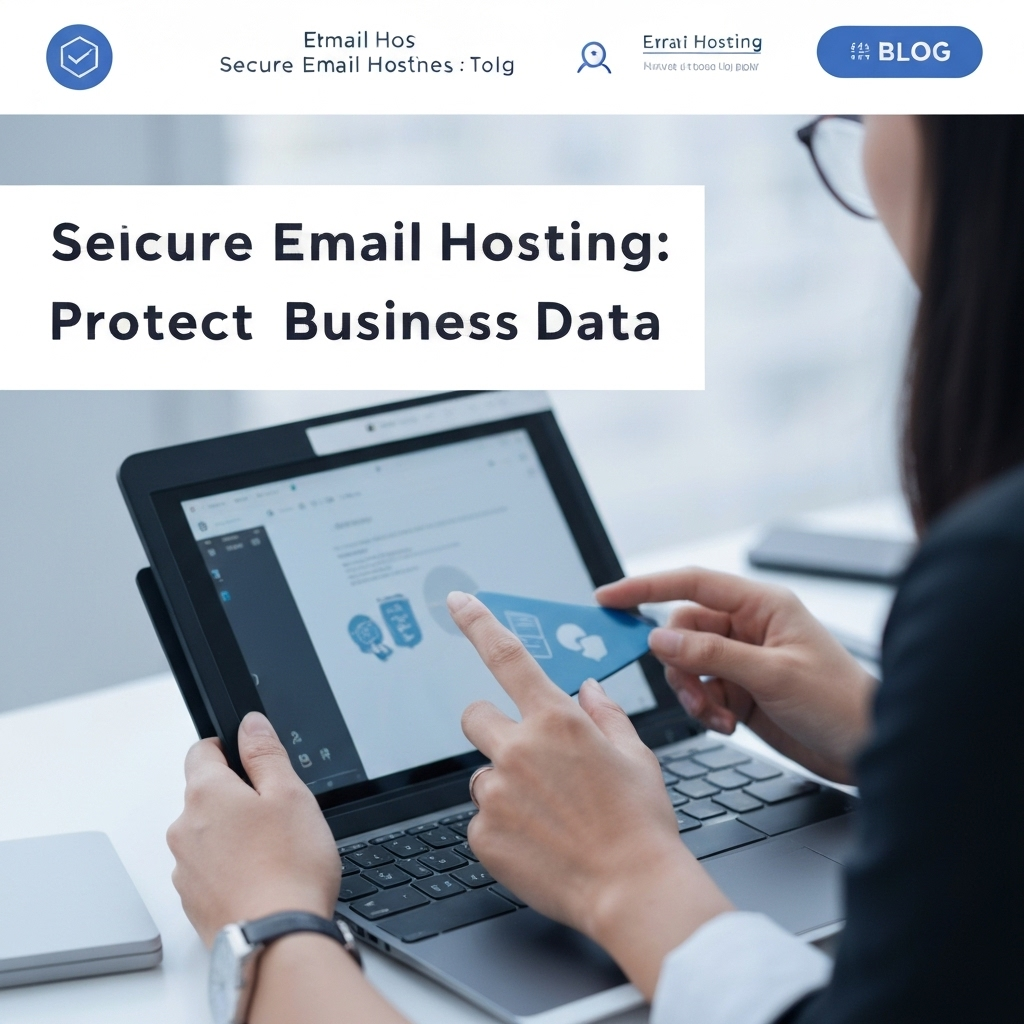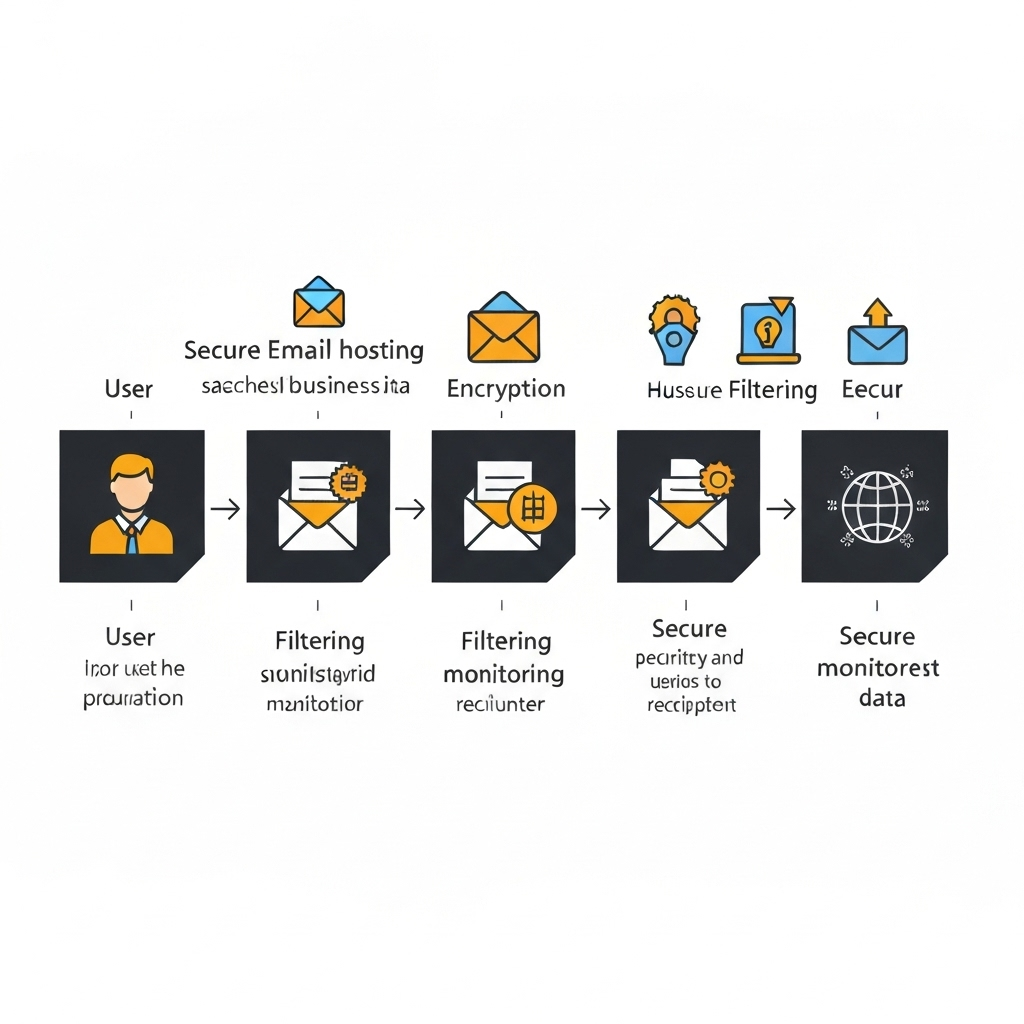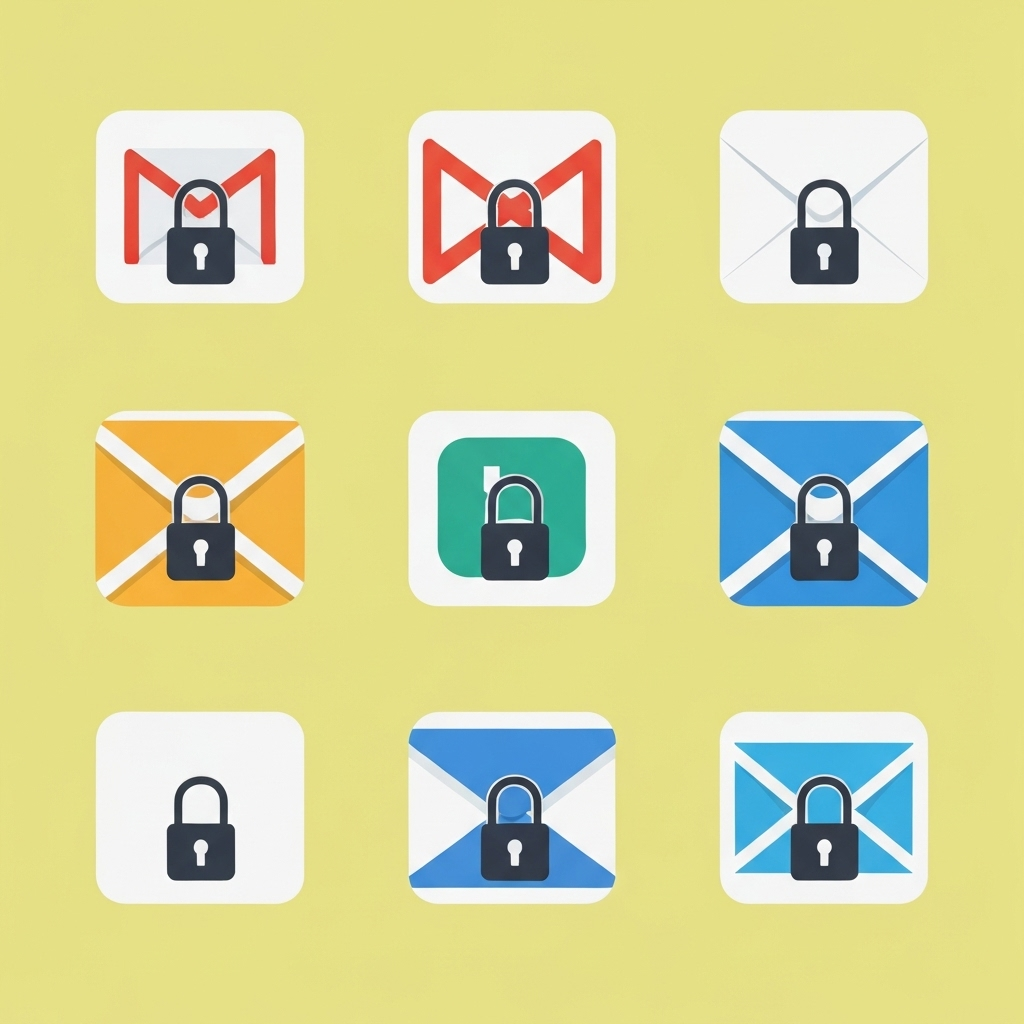Secure Email Hosting: Protect Your Business Data

In today's hyper-connected business world, email remains the primary communication channel for everything from client proposals and internal memos to sensitive financial data and strategic planning. It's the digital handshake, the virtual office, and the backbone of daily operations. For many, starting with a professional email address is the first step in establishing credibility. However, this indispensable tool is also a prime target for cybercriminals. The consequences of an email security breach can be devastating, leading to financial loss, reputational damage, regulatory penalties, and a loss of customer trust. This is precisely why investing in robust secure email hosting is no longer a luxury; it's a fundamental necessity for any business that values its data, its clients, and its future.
Gone are the days when a basic email service was sufficient. The digital landscape is constantly evolving, and so are the threats lurking within it. Businesses of all sizes are increasingly falling victim to sophisticated cyberattacks that leverage email as their entry point. Ignoring this reality is akin to leaving your company's front door wide open.
Understanding the Evolving Email Threat Landscape
The threats facing business email are more numerous and sophisticated than ever before. Cybercriminals are constantly innovating, using advanced techniques to bypass traditional security measures. Understanding these threats is the first step toward effective defense.
Common Email Threats Businesses Face:
- Phishing and Spear-Phishing: These attacks involve deceptive emails designed to trick recipients into revealing sensitive information (like login credentials or financial details) or downloading malware. Spear-phishing is a more targeted version, often impersonating trusted individuals or organizations.
- Malware and Ransomware: Malicious software, including viruses, worms, and ransomware, can be delivered via email attachments or malicious links. Ransomware encrypts your data and demands payment for its release, causing significant operational disruption.
- Business Email Compromise (BEC): This type of attack involves impersonating a high-level executive or trusted business partner to trick employees into transferring funds or divulging confidential information. BEC scams are highly sophisticated and can be incredibly convincing.
- Data Breaches: Poorly secured email systems can be a gateway for attackers to access and exfiltrate large volumes of sensitive customer data, intellectual property, or proprietary information.
- Denial-of-Service (DoS) Attacks: While less common directly targeting individual inboxes, compromised email systems can be leveraged in broader DoS attacks, disrupting communication flow.
Statistics paint a stark picture. According to some reports, a significant percentage of cyberattacks begin with an email. The FBI's Internet Crime Complaint Center (IC3) has reported billions of dollars in losses attributed to BEC scams alone. These aren't just abstract numbers; they represent real businesses struggling to recover from devastating losses. As noted by At-Bay, even with guidelines, a comprehensive secure email gateway is crucial for striking a balance between protection and usability.
The increasing sophistication of these attacks means that relying on basic, out-of-the-box email services is no longer sufficient. Businesses need proactive, multi-layered defenses to stay ahead of emerging threats. This is where the importance of comprehensive email security best practices and advanced solutions comes into play.
Key Features of Secure Email Hosting Solutions
When evaluating email hosting providers, it's crucial to look beyond just storage space and features. The core of a secure solution lies in its security architecture and the protective measures it employs. A robust secure email hosting service will offer a suite of features designed to safeguard your communications and data.
Essential Security Features to Look For:
- Encryption (In Transit and At Rest): This is paramount. Emails should be encrypted as they travel across the internet (using protocols like TLS) and also when stored on the server (encryption at rest). This ensures that even if intercepted, the content remains unreadable.
- Multi-Factor Authentication (MFA): Beyond just a password, MFA requires users to provide two or more verification factors to gain access to an account. This significantly reduces the risk of unauthorized access due to compromised credentials.
- Advanced Spam and Malware Filtering: Look for solutions that utilize AI and machine learning to detect and block a wider range of threats, including zero-day exploits, sophisticated phishing attempts, and known malware signatures.
- Access Controls and Permissions: The ability to define granular access levels for users and administrators ensures that employees only have access to the information they need, minimizing the risk of internal data leakage or unauthorized changes.
- Regular Data Backups and Disaster Recovery: In the event of a data loss incident, ransomware attack, or system failure, having reliable, frequent backups is critical for business continuity. The provider should have a clear disaster recovery plan.
- Intrusion Detection and Prevention Systems (IDS/IPS): These systems monitor network traffic for suspicious activity and can automatically block or alert administrators to potential threats.
- Compliance and Data Residency: For businesses operating in regulated industries (e.g., healthcare, finance) or subject to data privacy laws (like GDPR), ensuring the provider can meet specific compliance requirements and offer data residency options is vital.
- Secure Communication Tools: This encompasses the entire ecosystem, ensuring that the tools provided facilitate secure collaboration, whether through encrypted messaging, secure file sharing, or integrated security policies.
Choosing a provider that prioritizes these features is essential for effective data protection for email. It's about building layers of defense that protect your business from the ground up. As noted by the Canadian Centre for Cyber Security, implementing email security best practices, including proper server configuration and strong encryption, is fundamental to securing communication channels.
The Role of Encryption in Protecting Email Content
Encryption is the cornerstone of secure digital communication. It's the process of encoding information so that only authorized parties can access it. In the context of email, encryption plays a dual role: protecting data as it travels and protecting it when it's stored.
Encryption in Transit:
When you send an email, it travels through multiple servers before reaching its destination. Encrypted email hosting ensures that this journey is secure. Technologies like Transport Layer Security (TLS) encrypt the connection between email servers, preventing eavesdropping or interception of your messages while they are in transit. Without TLS, emails could be read by anyone monitoring the network traffic between servers.
Encryption At Rest:
Once an email arrives at the server, it's stored in a mailbox. Encryption at rest ensures that this stored data is protected. If a server's physical storage were compromised, the data would remain unreadable without the decryption key. This is crucial for maintaining business email privacy and protecting sensitive information from unauthorized access.
End-to-End Encryption (E2EE):
For the highest level of security, end-to-end encryption is often considered. With E2EE, only the sender and the intended recipient can decrypt and read the message. The email provider itself cannot access the content. Technologies like Pretty Good Privacy (PGP) or Secure/Multipurpose Internet Mail Extensions (S/MIME) enable E2EE, though they can sometimes be more complex to implement for everyday business use.
Investing in encrypted email hosting is a proactive step towards safeguarding confidential information, maintaining client trust, and complying with stringent data protection regulations. Services like Runbox emphasize their commitment to secure and private email services, highlighting the importance of encryption for their users.
AI's Impact on Enhancing Email Security and Privacy
Artificial Intelligence (AI) is rapidly transforming the landscape of cybersecurity, and email security is no exception. AI-powered solutions are moving beyond static, signature-based detection methods to offer dynamic, adaptive defenses capable of identifying and neutralizing complex threats that traditional systems often miss. This is a significant leap forward for AI email security.
How AI Strengthens Email Security:
- Advanced Threat Detection: AI algorithms can analyze vast amounts of data, including email content, sender behavior, link destinations, and attachment characteristics, to identify subtle anomalies indicative of phishing, malware, or BEC attacks. This allows for the detection of zero-day threats that haven't been seen before.
- Intelligent Spam and Phishing Prevention: AI can learn and adapt to new spamming techniques and phishing tactics in real-time. It can distinguish between legitimate communication and malicious intent with much higher accuracy than rule-based filters.
- Behavioral Analysis: AI can establish baseline "normal" behavior for users and systems. Any deviation from this baseline, such as an unusual login location, a sudden surge in outbound emails, or an attempt to access sensitive files, can trigger an alert.
- Automated Response: In some cases, AI can automate responses to detected threats, such as quarantining suspicious emails, blocking malicious senders, or alerting IT administrators, thereby reducing the time to remediation.
- Natural Language Processing (NLP): AI's NLP capabilities allow it to understand the context and sentiment of emails. This helps in identifying social engineering tactics used in phishing and BEC scams that rely on manipulation and urgency.
The integration of AI is not just about defense; it's also about efficiency. By automating threat detection and response, AI frees up valuable IT resources and reduces the burden on employees to constantly be on guard. Furthermore, modern businesses are increasingly turning to AI-powered solutions not just for efficiency, but also for enhanced security. Tools like an ai executive assistant can significantly bolster your defenses by analyzing communication patterns, detecting anomalies, and even helping to flag suspicious messages before they reach your inbox. This proactive approach is revolutionizing 'AI email security' and contributing to better overall data protection for email.
As AI continues to evolve, its role in securing our digital communications will only grow, offering businesses more sophisticated and effective ways to protect themselves from an ever-changing threat landscape.
Choosing the Right Secure Email Hosting Provider: What to Look For
Selecting the right secure email hosting provider is a critical decision that impacts your business's security, productivity, and compliance. It requires careful consideration of several factors beyond just price and storage capacity. Think of it as choosing the foundation for your business's digital communication infrastructure.
A Practical Checklist for Providers:
- Security Certifications and Audits: Look for providers that hold recognized security certifications such as ISO 27001 or SOC 2. These indicate that the provider adheres to stringent international standards for information security management. Regular independent audits are a good sign of ongoing commitment.
- Data Center Security: Inquire about the physical security measures at the provider's data centers, including access controls, surveillance, and environmental safeguards.
- Reputation and Track Record: Research the provider's history. Do they have a good reputation for reliability, security, and customer support? Look for reviews and testimonials from businesses similar to yours.
- Uptime Guarantees (SLA): A Service Level Agreement (SLA) detailing guaranteed uptime is essential for business continuity. Aim for providers offering 99.9% uptime or higher.
- Scalability and Flexibility: Can the service grow with your business? Does it offer flexible plans that can accommodate changes in user numbers or storage needs? Providers like Mailbox.org emphasize adaptability and scalability for business requirements.
- Support and Responsiveness: What kind of customer support is offered? Is it 24/7? How quickly do they typically respond to issues? Prompt support is crucial during a security incident.
- Compliance Features: If your business operates under specific regulations (e.g., HIPAA, GDPR), ensure the provider offers features and contractual agreements to help you meet those compliance obligations.
- Data Control and Privacy Policy: Understand who owns your data and how the provider uses it. A transparent privacy policy is a must.
- Features Beyond Basic Email: Consider if the provider offers integrated collaboration tools, advanced calendar features, or other productivity enhancements that align with your business needs. A strong business email service should aim to boost productivity and efficiency.
Remember, a cheap solution often comes at the cost of security or features. Investing in a reputable provider offering comprehensive secure email hosting and excellent secure communication tools is an investment in your business's long-term safety and success. As Zoho suggests, choosing a more secure, reliable, and customizable business email solution is a wise strategic move.
How MailToPie Delivers Superior Security and Productivity
In the quest for robust email security and enhanced productivity, businesses are increasingly looking towards AI-driven solutions. MailToPie stands out as a platform designed to leverage the power of AI to not only streamline communication but also to fortify your defenses against modern cyber threats.
MailToPie's approach to AI email security is multi-faceted. At its core, the platform uses advanced AI algorithms to analyze incoming and outgoing emails, identifying patterns that indicate malicious intent. This goes beyond simple keyword filtering or known virus signatures. MailToPie's AI can detect:
- Sophisticated phishing attempts that mimic legitimate communications.
- Suspicious sender behavior and anomalies in communication patterns.
- Malware hidden within attachments or disguised as legitimate files.
- Social engineering tactics used in Business Email Compromise (BEC) scams.
This proactive threat detection means that potential security incidents are flagged and neutralized before they can impact your business, significantly contributing to better data protection for email. By automating much of the threat analysis, MailToPie reduces the burden on your IT team and provides peace of mind to your employees.
Beyond security, MailToPie is engineered to boost productivity, especially for busy executives and professionals. Its AI capabilities can help:
- Prioritize your inbox: Automatically sort and flag important messages.
- Draft responses: Generate context-aware replies to common queries.
- Schedule meetings: Intelligently find available times and coordinate schedules.
- Summarize long threads: Quickly grasp the essence of lengthy email conversations.
- Manage tasks: Convert emails into actionable to-do items.
These features, combined with its robust security protocols, make MailToPie an ideal solution for businesses seeking to enhance both their security posture and their operational efficiency. By integrating advanced AI, MailToPie provides not just an email service, but a comprehensive communication and security assistant. For those looking to leverage AI for a more efficient and secure professional life, exploring solutions like MailToPie is a strategic step forward. You can learn more about leveraging AI for efficiency by exploring relevant AI for email.
Conclusion: Securing Your Communication for Future Growth
In the digital age, your email system is more than just a communication tool; it's a critical asset that holds sensitive business data, client information, and the very essence of your operations. The escalating sophistication of cyber threats means that neglecting secure email hosting is a gamble no business can afford to take. From protecting against devastating phishing attacks and ransomware to ensuring business email privacy and compliance with regulations, robust security is non-negotiable.
Investing in a secure, reliable, and advanced email hosting solution is an investment in your company's resilience, reputation, and future growth. It empowers your team to communicate with confidence, knowing their data is protected. By understanding the threats, identifying key security features, and choosing a provider that prioritizes your safety – perhaps one leveraging cutting-edge AI like MailToPie – you can build a secure communication foundation that supports your business objectives.
Don't wait for a breach to highlight the vulnerabilities in your current system. Take proactive steps today. Evaluate your existing email setup, understand the risks, and make the informed decision to adopt a truly secure email hosting solution. Your business's future depends on it.



